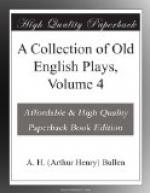The play bears some indications of having been written in 1613. In I. 2, where the Duke’s brothers are devising schemes for enriching themselves at the state’s expense, occurs the following passage:—
“Al. I have a commission drawne for making glasse. Now if the Duke come, as I thinke he will, Twill be an excellent meanes to lavish wood; And then the cold will kill them, had they bread.
Hat. The yron Mills are excellent for that. I have a pattent drawne to that effect; If they goe up, downe goes the goodly trees; Ile make them search the earth to find new fire.”
The mention of the “yron Mills” appears to refer to the patent granted to Clement Daubigny for cutting iron into rods. On 13th March,[159] 1612-13, the Commissioners of Suits forwarded to the Lord Mayor a petition from Daubigny for the renewal of letters patent. They enclosed petitions from nailmakers and other smiths, shipmasters, shipowners, and shipwrights, from which it would appear that the iron imported from foreign parts was brittle and useless; and being themselves unable to judge accurately of the quality of iron, they directed the Lord Mayor to take the evidence of the Master and some of the Wardens of the Blacksmiths’, Ironmongers’, and Carpenters’ Companies, of the Master and some of the Brethren of the Trinity House, and of any others that he might think fit to consult: after hearing the evidence, he was to draw up a statement of his own views and return Daubigny’s petition. On 31st March the Lord Mayor addressed a letter to the Lords of the Council, in which he stated that from the evidence of the various witnesses he had been convinced that the patent would raise the price of iron, hinder the king in his customs, and further the decay of woods; and he added that the Flemish iron was for the most part good and tough. It will be observed that one of the objections raised by the Lord Mayor to the granting of the patent—namely that a great consumption of wood (as fuel for smelting the ore) would follow—is specially put forward by the dramatist. The mention in Alfred’s speech of a scheme for glassmaking seems also to suggest 1613 as the date of authorship; for on 17th November of that year Sir Jerome Bowes and Sir Edward Zouch procured patents for making glass.[160]
There are other allusions that point to 1613. In II. 4, we find—“Make us for want coyn brasse and passe it current.” The first patent for the coining of brass farthing-tokens was granted on 10th April, 1613, to John Stanhope, Lord Harrington; and the grant caused general dissatisfaction.[161] Again: in the same scene there is a reference to the exportation of broad cloth:—“I, an’t please your honour, have a commoditie of good broad cloth, not past two hundred; may I shippe them over? and theres a hundred poundes.” When we turn to the State Papers we discover that numerous complaints were made in 1613 about the exportation




